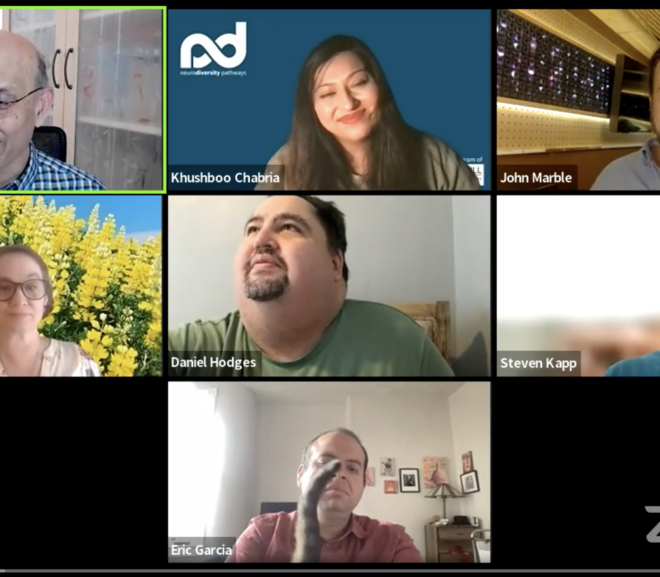The book Neurodiversity for Dummies is happening because there really is a dearth of accessible information and resources. This listening session is a conversation about what neurodiversity is, and what neurodivergent people need to thrive.
Tag: Steven Kapp
Ira Eidle is the curator of the of Autistic Archive, an online resource that responds to “a need for better preservation of information related to the Autistic Community and Neurodiversity Movement’s history.”
Photo © Gayan Gunawardana | Creative Commons [image: Backlit photo of a sad ponytailed person with their head down, in profile in front of an ocean sunset.] Dr. Sarah Cassidy co-chaired a SIG (Special Interest Group) on Autism and Suicidality at IMFAR 2016, in Baltimore. We weren’t able to attend her session, but Dr. Cassidy was kind enough to take time, later that same day, to talk with TPGA editors Shannon Rosa and Carol Greenburg, autistic autism researcher Dr. Steven Kapp, and Autistic Self Advocacy Network Executive Director Julia Bascom. The following is a transcript of our conversation. —- Shannon Rosa: Tell us about what you discussed in the SIG. What has your research revealed about suicidality in autistic people? Dr. Cassidy: We’ve published two studies so far. The first study we did, which is free to access in the new Lancet (Psychiatry) journal, was a medical chart review, a…
Shannon Des Roches Rosa www.squidalicious.com Photo © Jeffrey Beall | Flickr / Creative Commons [image: Photo of metal letters spelling “Science” affixed to a brick wall.] At a recent workshop on How to Find Autism Information That Will Help You, I noted that a key factor for evaluating an autism resource is: Who does the approach primarily benefit? Autistic people themselves, or people affiliated with autistic people, such as families or teachers? It’s important to identify this aim, because approaches that support autistic people in living lives of maximized happiness and potential can be very different from the parent-centered approaches—which too often portray autistic people as problems to be managed and controlled. We at Thinking Person’s Guide to Autism support the helping approach, and routinely criticize the problem/control approach—an ongoing effort as the latter remains pervasive both in popular culture, and in research. The problem/control approach is also a theme…
Autism is so much a part of who your child is that many of us Autistic adults who are able to communicate, and who choose to talk about being Autistic, will tell you that it hurts us to hear or read phrases like “fight autism,” because it feels like people want to fight us.
Shannon Des Roches Rosa with Carol Greenburg Your faithful TPGA editors spent most of last week in Baltimore, Maryland at IMFAR, the International Meeting for Autism Research. We gleaned as much as we could from the 2000 scientists, professionals, autistic people, and family members from all over the world who spent three full days talking about the most current findings and trends in autism research. But we didn’t cover everything or meet everyone we wanted to, because doing so is not physically possibly without a Time Turner. (If you ever want to experience abject FOMO — fear of missing out — by all means, go to IMFAR.) Overview Ninety-nine percent of the researchers at IMFAR are the nicest, most well-meaning scientists one could ever meet, which makes for a friendly atmosphere. We were happy to see significant progress on some research fronts: only a single presentation about vaccines, and it…
Steven Kapp, PhD I critically lectured on autism and “outcomes” like “recovery” for my UCLA Autism and Neurodiversity class the day the New York Times article The Kids Who Beat Autism came out, then saw a related statement I wrote* for the Autistic Self Advocacy Network shared widely later that same day — so I mulled over how much more attention to give the NYT story. I finally decided to write an updated response for my students, focusing on the cited research, including Catherine Lord’s critiques of Deborah Fein, my critiques of Lord, and my critiques of the new article. I otherwise sat on the response for days but decided to share it on Facebook as a status update and then, with my friend Amy Sequenzia’s encouragement, as a public Note. Now, following several TPGA editrixes’ well-deserved vacations, I am honored to give the response wider exposure through my first…
The Autistic Self-Advocacy Network’s Ari Ne’eman and Steven Kapp have released a policy brief: What Are the Stakes? An Analysis of the Impact of the DSM-5 Draft Autism Criteria on Law, Policy and Service Provision [PDF]. The full PDF brief can be found at bit.ly/DSM-5, and “…summarizes the legal and policy details of the program under discussion and attempts to identify the likely implications of the DSM-5’s outlined changes in the criteria for Autism Spectrum Disorder on eligibility, benefits, and access to services and legal rights.” The legal and policy areas in question are described, then followed by analyses of the proposed DSM-5 changes’ implications: Individuals with Disabilities Education Act (eligibility criteria) Impact of DSM-5 Shifts on Students with Disabilities Receiving Services Under IDEA ADA/504 Accommodations (guaranteeing non-discrimination re: disability in schools and in the workplace) Impact of DSM-5 Shifts on ADA/504 Protections Medicaid-Funded Developmental Disability Services Impact of the…





